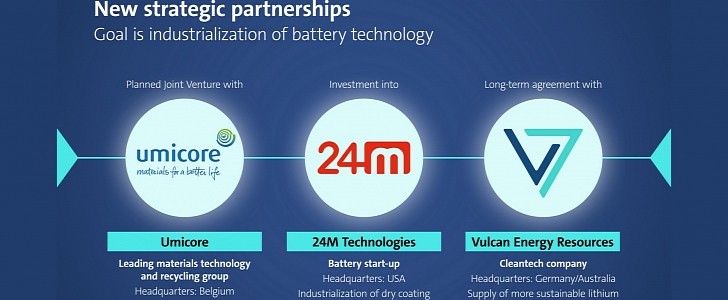Volkswagen knows that it cannot rely on battery suppliers. With electric cars, producing them will be a crucial competency that automakers will have to master, even if through partnerships at first. The German carmaker established three of them all at once to deal with cathode production, lithium sourcing, and getting a better manufacturing process than dry coating.
The companies responsible for helping Volkswagen on that are respectively Umicore, Vulcan Energy Resources, and 24M. The benefits of these partnerships should be first seen at the Salzgitter factory, where Volkswagen expects to start delivering 20 GWh in batteries starting in 2025. Volkswagen plans to have six battery factories in Europe, able to provide 160 GWh by 2030, enough for producing 2.2 million EVs per year.
Umicore is specialized in precursor and cathode material production, which Volkswagen considers strategic to localize in Europe after the international health crisis demonstrated how fragile supply chains could be. The companies said they believe they have complementary skills that may benefit both of them.
Regarding Vulcan Energy Resources, it will help Volkswagen obtain CO2-neutral lithium extracted from a geothermal brine located in the Upper Rhine Valley in Germany. The agreement is for lithium hydroxide for five years, starting in 2026.
Vincent Ledoux Pedailles shared how much lithium hydroxide he expects his company to sell to Volkswagen in a tweet. According to the vice president of business development at Vulcan, that number will be between 34,000 metric tons and 45,000 metric tons throughout the agreement. We would not be surprised if Vulcan and Volkswagen expanded this agreement to even more raw materials.
Finally, it is Volkwagen’s agreement with 24M that deserves more attention. The MIT spin-off developed a semi-solid process for battery manufacturing that would be superior to the dry coating process Tesla is so proud of with the 4680 cells it is yet to deliver. Curiously, Volkswagen refers to this process as "an improvement over the dry coating process," but released images that treat it as a dry coating process on its own. We'll get in touch with 24M to clarify this.
According to the videos below and the company’s website, this technology consists of a semi-solid electrode that reduces production costs for lithium-ion cells by 50%. It is not clear if it is something similar to what SES plans to offer with the Apollo cell, but the description seems quite like it.
All these partnerships will help Volkswagen develop its unified cell, which will be instrumental to its electrification plans. The idea is that a single cell format with different chemistries will allow Volkswagen to achieve a production scale that will put it at the forefront of electric car production. Remember that Volkswagen is also a significant partner for QuantumScape, a company that is pretty confident about the solid-state cell platform it is developing.
Umicore is specialized in precursor and cathode material production, which Volkswagen considers strategic to localize in Europe after the international health crisis demonstrated how fragile supply chains could be. The companies said they believe they have complementary skills that may benefit both of them.
Regarding Vulcan Energy Resources, it will help Volkswagen obtain CO2-neutral lithium extracted from a geothermal brine located in the Upper Rhine Valley in Germany. The agreement is for lithium hydroxide for five years, starting in 2026.
Vincent Ledoux Pedailles shared how much lithium hydroxide he expects his company to sell to Volkswagen in a tweet. According to the vice president of business development at Vulcan, that number will be between 34,000 metric tons and 45,000 metric tons throughout the agreement. We would not be surprised if Vulcan and Volkswagen expanded this agreement to even more raw materials.
Finally, it is Volkwagen’s agreement with 24M that deserves more attention. The MIT spin-off developed a semi-solid process for battery manufacturing that would be superior to the dry coating process Tesla is so proud of with the 4680 cells it is yet to deliver. Curiously, Volkswagen refers to this process as "an improvement over the dry coating process," but released images that treat it as a dry coating process on its own. We'll get in touch with 24M to clarify this.
According to the videos below and the company’s website, this technology consists of a semi-solid electrode that reduces production costs for lithium-ion cells by 50%. It is not clear if it is something similar to what SES plans to offer with the Apollo cell, but the description seems quite like it.
All these partnerships will help Volkswagen develop its unified cell, which will be instrumental to its electrification plans. The idea is that a single cell format with different chemistries will allow Volkswagen to achieve a production scale that will put it at the forefront of electric car production. Remember that Volkswagen is also a significant partner for QuantumScape, a company that is pretty confident about the solid-state cell platform it is developing.
????Very pleased to announce that we have signed a supply agreement with @VWGroup. VW is the world's largest automaker?by revenue and the largest company in Germany. @VulcanEnergyRes has previously secured deals with @Stellantis @renaultgroup @UmicoreGroup and LG pic.twitter.com/ZuN7E1F90N
— Vincent Ledoux Pedailles (@LedouxPedailles) December 8, 2021









